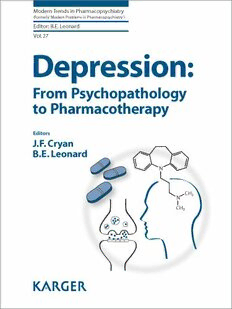
Depression: From Psychopathology to Pharmacotherapy (Modern Trends in Pharmacopsychiatry) PDF
283 Pages·2010·4.477 MB·English
Most books are stored in the elastic cloud where traffic is expensive. For this reason, we have a limit on daily download.
Preview Depression: From Psychopathology to Pharmacotherapy (Modern Trends in Pharmacopsychiatry)
Description:
Despite the availability of antidepressants for over 40 years, a substantial proportion of depressed patients do not respond adequately to treatment. Failure to respond effectively to treatment contributes to physical ill-health and psychiatric morbidity, often resulting in premature death of the depressed patient. The purpose of this volume is to consider the possible reasons for the limitations of the currently available antidepressants, to examine the advances in our understanding of the psychopathology of depression and how such knowledge may assist in the discovery of new methods of treatment. Leading international experts in this field discuss the possible underlying reasons for depression and limitations of current antidepressants. Opportunities for novel therapeutic approaches to dysfunctional circadian rhythms and mood disorders as well as current status and future perspectives for optimizing antidepressant management of depression are reviewed. This publication illustrates the breadth of the latest research and is valuable reading for psychiatrists, neuroscientists and pharmacologists.
See more
The list of books you might like
Most books are stored in the elastic cloud where traffic is expensive. For this reason, we have a limit on daily download.
